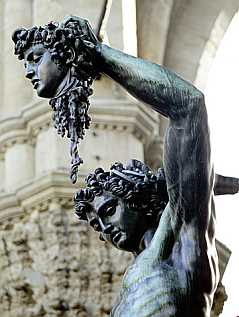In the last week, controversy flared around the recent prank pulled by a Minneapolis/St. Paul radio station. Michael Spencer, the iMonk, alerted me to this, and other blogs have pounced on the story.
In short, the radio station offered a Playstation 3 to parents who would drop off their baby at the station for the day. People lit up the phone line for a chance to let strangers have their baby for 24-hrs in exchange for the impossible-to-find new videogame player. When they found out the little social experiment was a ruse, they felt cheated.
Apart from the appalling fact that iMonk’s e-mail started a catfight between the handful of respected Christian bloggers he cc’ed, the blogosphere’s seen more than enough handwringing on this incident. Like whalebone-corseted dowagers in brocade dresses, their lorgnettes fogged from the mere thought of parental impropriety, the voices of outrage fan themselves and harumph, “The nerve of such people!”
Though the Marx Brothers’ zany antics punctured the moralistic gasbags depicted in their films,  I suspect the Lord’s not laughing about our profound moralism. Moralists don’t come off well in the Bible. They get lines like “Thank you, Lord, that I’m not like this tax collector sinner” and “This fellow is blaspheming!” and “Look! Your disciples are doing what is unlawful on the Sabbath.” Moralists will tithe their entire spice rack, and still miss the point.
I suspect the Lord’s not laughing about our profound moralism. Moralists don’t come off well in the Bible. They get lines like “Thank you, Lord, that I’m not like this tax collector sinner” and “This fellow is blaspheming!” and “Look! Your disciples are doing what is unlawful on the Sabbath.” Moralists will tithe their entire spice rack, and still miss the point.
Moralists are a dime a dozen. Find any bait shop in any podunk town in America, and grizzled faces tucked into the store’s recesses will be more than obliged to regale you with their opinion on the latest indignation sweeping the country. They’ll quote any and all sources to make their point, calling on long-dead orators like Henry Clay (old) and Seneca (older), or even some Asian philosopher like Lao-Tsu. Anything to drive their wicked barb of truth through the heart of this perceived scourge or that. In fact, I’d go far as to say that no country on the face of this planet brews up righteous indignation as the good ole U.S. of A.
Unfortunately, you can be a moralist extraordinaire and still wind up in hell.
How so? Because moralism’s got nothing to do with Christianity. Jesus Christ didn’t come to set-up another moral system. He came to change dead-in-the-soul moralists into living and active saints equipped not with the latest hodge-podge of self-righteous ire, but with the mind of Christ.
What else explains the Lord saying, “You have heard it said, _____________, but I tell you…”? He didn’t support the moralistic status quo, He tore it off its foundation and installed Himself in its place. And by the way He ministered to others, He gave us a blueprint for how a redeemed mind acts out the truth of God.
Renewing our minds means allowing Christ to wash away moralistic responses to the situations that face us every day. We need to learn to think like a real follower of Christ, rather than a moralist.
I confess that I’ve spent too many years thinking like a moralist and not a true follower of Christ. I had a moral system erected the envy of pietists worldwide. My righteous indignation burned hotter than the core of the sun, and I could rip into an abortionist with mental talons honed to razor-sharpness. And you know what? None of that expanded the Kingdom of God by one picometer.
Want to think like a Christian? Here’s what I’m learning:
1. The only way our “moral foes” are going to change is by coming to Christ.
Nothing else works, folks. Not political wrangling. Not outnumbering. Nothing. Only Jesus. We can’t make anyone conform to Christ unless they’re born again. The world’s going to resist our moralism tooth and nail. Jesus, though, is harder to resist.
2. No one is beyond redemption by Jesus Christ.
In college, I knew a man who’d been the most wanted outlaw in Texas. A string of armed robberies got him a sentence of 500 years in prison. Then he met Christ through Chuck Colson’s Prison Fellowship. His change was so profound, he received a formal pardon from the governor. He came to study at Wheaton while I was there. We ate many meals together and I once drove him from college to see his brother who lived in my hometown. I’d trust Don with my wife and son. Jesus Christ had found him and utterly changed him.
It doesn’t matter who our opponents are. No matter how despicable we consider someone, Jesus Christ is greater than his or her sin.
3. Always lead with love.
Sometimes we act as if every act of love toward our foes must be that fabled “tough love.” That’s a lie. Actually, it’s an excuse for us to club them in the name of Christ. The Bible says this:
“You have heard that it was said, ‘You shall love your neighbor and hate your enemy.’ But I say to you, Love your enemies and pray for those who persecute you, so that you may be sons of your Father who is in heaven. For he makes his sun rise on the evil and on the good, and sends rain on the just and on the unjust. For if you love those who love you, what reward do you have? Do not even the tax collectors do the same? And if you greet only your brothers, what more are you doing than others? Do not even the Gentiles do the same? You therefore must be perfect, as your heavenly Father is perfect.
—Matthew 5:43-48 ESV
The moralist leads with his self-righteousness, but the true follower of Christ always leads with love, even when dealing with his enemies.
Only as I was preparing this did a greater truth strike me about the Matthew passage. Jesus ends it with “You therefore must be perfect, as your heavenly Father is perfect.” While we always talk about context, no commentary gives an interpretation for that phrase that has ever satisfied me. But now I get it.
In context, the perfection Christ asks of us is to love perfectly. God embodies that perfect love because He desires that not one human soul be lost, despite the reality that our world is filled with people who hate Him. By us loving our enemies, we embody that same love of God.
Though missionary Jim Elliot wore a pistol in the steamy jungles of Ecuador, he took a fatal spear rather than use that pistol to take the life of someone certainly bound for hell. The man who threw that spear is a believer today.
Do we understand that kind of perfect love? Moralists never will.
4. Put ourselves in other people’s shoes.
In those instances when I find it easy to judge, I first exchange roles with the person I’m ready to throttle. What do I know about him? Is he the way he is because he came home from school every day as a kid to a father who beat him to within an inch of his life? Does she act out her sin because her uncle raped her repeatedly from age eight until she packed up and hit the streets?
I know iMonk doesn’t remember this, but I got banninated from The Boar’s Head Tavern a long time ago because we clashed over people’s pasts. I took the position that one’s hard-luck story won’t keep anyone out of hell. Sin is sin. If the weepiest story got the worst sinner into heaven, then the afterlife resembles the old TV show “Queen for a Day” and not the heaven Christ died to populate.
I still firmly believe that. However, that doesn’t mean that I should add pain onto pain. Christ exchanged roles with each one of us, bearing your sin and mine to the cross. For that reason, I need to put myself into someone else’s shoes before I go off half-cocked. If the savior thought enough to bear my sin unto death, then the least I can do is draw alongside others and help bear their burden until they also find life in Christ.
5. Ask the hard, humbling questions.
Bono’s received an enormous amount of flak in some parts of the Godblogosphere. They say all manner of nasty things against him as if they know him personally and are fit to speak apt judgment.
Two things that provoke Bono’s opponents more than anything else include his stand for more money to battle AIDS in Africa and his campaign to eliminate debts held against poor nations. For these he seems to draw more than his fair share of fire from Christians.
Personally, Bono’s not at issue here. I don’t know him and I don’t generally trust third-hand reports about most worldwide or nationally-known figures. He may be the spawn of hell just like his opponents say or he may not. What concerns me more as a Christian is to ask where are all the “approved” Christian voices speaking out on battling AIDS in Africa and eliminating the debt load of poor countries? Why aren’t we fronting for these causes? Why are we not battling for justice? Where are our nationally-known righteous preachers and teachers on these things? Why are they silent? Why must Bono step into the obvious vacuum they’ve left behind?
Worse yet, what about me? How can I castigate anyone if my saggy posterior’s parked in some hoity-toity coffeeshop tucked away from the hardscrabble life faced by most of the world’s people, my pinkie righteously extended as I sip my vente triple mochachino?
Anymore, the second I feel the urge to tear into another human being, I ask the hard, humbling question and the answer looks like a finger pointing right back at me and the rest of us in the American Church. Doesn’t matter what the issue is, in some way we American Christians have fumbled it. And rather than sit around and grouse about how other people deal with that issue, the true follower of Christ has a response:
6. Stop talking, start acting.
If you and I are unwilling to act, then we should just shut up. Moralists go on and on about issues they never plan to personally do anything about. They fill their lives with idle chatter while callouses form on their backsides.
If you and I don’t like something, then let’s start acting to fix it. That’s the Kingdom of God in action. And I’m not talking about the typical painless moralistic responses to fixing big problems, but the ones that cost us something. Pulling a lever in a voting booth against gay marriage doesn’t ask anything. Befriending a gay couple does.
I’ve learned over the years that most foes of Christianity have never in their lives encountered a true follower of Christ. Nor do they have the kind of prayer covering we take for granted. Is it any wonder then that the Enemy’s come in and sowed evil seeds on their unprotected ground?
Griping about people willing to exchange their babies for a day for a shot at a PS3 accomplishes nothing. We live in a world populated by rich churches that think they do a lot for the poor, but largely ignore them, even during Christmastime. Sure, they may contribute a few bucks here and there, but they never give till it hurts. In a lot of cases, they won’t even give to people in their own congregations who have dire financial needs.
Untrue? I blog on these kinds of issues. You should read the private letters I get from desperate people who turned to their churches for help and were sent away.
Playstation 3s are selling for upwards of $3,000 on eBay. Desperate people do desperate things and they don’t always think clearly. While this doesn’t excuse parents willing to hand their children over to strangers for a day, to a poor family, a few thousand dollars means food, shelter, clothes, and heat for the cold winter months.
Was everyone calling in so desperately poor that their first thought was to resell that PS3 to feed, clothes, house, and warm their family? Hardly. Still, I’m sure a handful existed in the hundreds who called the radio station.
Where is the Church for those families? We stuff ourselves for Thanksgiving. We close off our holiday celebration to outsiders who might benefit from our outrageous largesse. We spend and spend and spend on ourselves, toss a few dollars in a Salvation Army kettle and pat ourselves on our backs for such stirring generosity as we push a cartful of expensive junk we don’t need out to our SUVs.
Our society cares nothing for the poor on a personal basis. Yes, they seem to get some rare attention from us during the holidays, but otherwise we tend to let our governments take care of them. Few of us know any poor families personally, and even fewer of us take the time to reach out to them and welcome them into our homes, developing godly relationships that last. Yet that’s what Jesus would have done.
Hate the greed on display in the Playstation 3 stunt? Let’s check our own hearts and make certain our own consciences are clear of consumeristic greed before we point out someone else’s. Some of us work two jobs to fuel our lust for more, robbing our children in just a slightly different way than those parents willing to give up a kid for a day. We may be giving up our kids every day, so who are we to talk! We may be affixed to the computer, blogging away as our children grow up without our attention. We may be into our hobbies, or even spend too much time reading Christian books.
What goes around comes around.
Let’s give till it hurts this Christmas—and every day that follows it. Let’s esteem others, even the poor, better than ourselves. Let’s babysit the children of the just-barely-getting-by single mother so she can have time to get a couple toys for her kids. In fact, why not buy the toys for her kids out of our own wealth so she can have a break this year.
Don’t just talk about Christ. Show Him to a dying world.
7. Weep.
This is my own opinion here, so you can take it for what it’s worth. I can’t back it with a ton of Scripture, but I believe it’s true to the heart of the Lord.
I worry about any “Christian” person who can go into a secluded prayer chamber and fail to weep for the lost and hurting people of this world. If we’re not in tears from time to time over the state of our foes, then I believe we’re moralists and not followers of Jesus Christ. The stakes are too high for us to be that hardened.
It saddens me that I’ve learned these lessons so late in life. I write this so you younger readers especially will start thinking like the Lord much sooner than I have. (One day I promise, as a warning, to do a series on my disqualifications for ministry.)
God help us if we’re moralists. A church of moralists always does more harm for the Kingdom than it does good. If that’s your church—or even you—you have a tough choice to make. I pray that the Father gives us all grace to choose the better way.
 Those good works include such things as evangelizing the lost, training the young, feeding the hungry, fighting injustice, stewarding the Earth, and befriending the friendless.
Those good works include such things as evangelizing the lost, training the young, feeding the hungry, fighting injustice, stewarding the Earth, and befriending the friendless.
 Last week, I
Last week, I  I suspect the Lord’s not laughing about our profound moralism. Moralists don’t come off well in the Bible. They get lines like “Thank you, Lord, that I’m not like this tax collector sinner” and “This fellow is blaspheming!” and “Look! Your disciples are doing what is unlawful on the Sabbath.” Moralists will tithe their entire spice rack, and still miss the point.
I suspect the Lord’s not laughing about our profound moralism. Moralists don’t come off well in the Bible. They get lines like “Thank you, Lord, that I’m not like this tax collector sinner” and “This fellow is blaspheming!” and “Look! Your disciples are doing what is unlawful on the Sabbath.” Moralists will tithe their entire spice rack, and still miss the point.